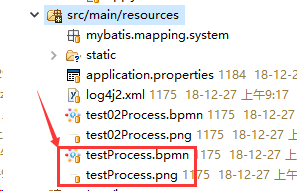For the basic configuration of the project, please refer to the introduction to Springboot I. use myEclipse to create a new Springboot project and myEclipse to create a new Springboot project. Now let's add an Activiti5.22 support to the project. Spring boot uses version 2.0.7 (later, trying to upgrade to 2.1.1 and 2.2.1 is a failure). The details are as follows:
- pom.xml adds the following configuration information
<!-- 1.Set up Springboot Edition -->
<parent>
<groupId>org.springframework.boot</groupId>
<artifactId>spring-boot-starter-parent</artifactId>
<version>2.0.7.RELEASE</version>
<relativePath />
</parent><! -- 2. Set common parameters -- >
<properties>
<project.build.sourceEncoding>UTF-8</project.build.sourceEncoding>
<project.reporting.outputEncoding>UTF-8</project.reporting.outputEncoding>
<java.version>1.8</java.version>
<! -- when Maven install, if the Chinese output in the Test environment @ Test is garbled, add this sentence and try -- >
<argLine>-Dfile.encoding=UTF-8</argLine>
<! -- set the activity version to be integrated -- >
<activiti.version>5.22.0</activiti.version>
</properties><!-- 3.Introduce Activiti Support -->
<dependencies>
<dependency>
<groupId>org.activiti</groupId>
<artifactId>activiti-spring-boot-starter-basic</artifactId>
<version>${activiti.version}</version>
</dependency>
</dependencies>- Add the following configuration information to the configuration file
# Set up the activity table automatically when the system starts (this setting is not required in the version of Springboot1.x) # Always is to always perform initialization, embedded only initializes the memory database (default value), such as h2, and never is not to perform initialization spring.datasource.initialization-mode=always # Activiti configuration ## Automatically build activity database table, set value="true", detect when starting, no table creation, skip with table; set value = "drop create" ## Create a new table every time you start (it takes effect in Springboot1.x, and it doesn't take effect in Springboot2.x, so it is closed) #spring.activiti.database-schema-update=true ## Activiti auto deployment verification settings: true - on (default), false - off spring.activiti.check-process-definitions=false ## Setting true will replace those old job executors spring.activiti.async-executor-enabled=false ## Activiti timing scanning task, default: true (on), it is recommended to turn it off if it is not used, and it needs to be used with spring. Activiti. Async executor enabled = false, otherwise it will not work spring.activiti.job-executor-activate=false
3. Create process file
Place the created file in the src/main/resources directory
4. Create a test service
import org.activiti.engine.RepositoryService;
import org.activiti.engine.RuntimeService;
import org.activiti.engine.TaskService;
import org.activiti.engine.repository.Deployment;
import org.activiti.engine.repository.ProcessDefinition;
import org.activiti.engine.runtime.ProcessInstance;
import org.activiti.engine.task.Task;
import org.springframework.beans.factory.annotation.Autowired;
import org.springframework.stereotype.Service;
@Service
public class ActivitiTestService {
@Autowired
private RepositoryService repositoryService;
@Autowired
private RuntimeService runtimeService;
@Autowired
private TaskService taskService;
/**
* @Function Description: process test
*
* @param flowType
*/
public void test(String flowType){
//Deployment process, as long as it is an XML file conforming to BPMN 2 specification, can be deployed by ACTIVITI in theory
Deployment deployment = repositoryService.createDeployment().name("Test process I").addClasspathResource("testProcess.bpmn").addClasspathResource("testProcess.png").deploy();
//Get process definition
ProcessDefinition processDefinition = repositoryService.createProcessDefinitionQuery().deploymentId(deployment.getId()).singleResult();
//Start process definition and return to process instance
ProcessInstance pi = runtimeService.startProcessInstanceById(processDefinition.getId());
String processId = pi.getId();
System.out.println("Process created successfully, current process instance ID: "+processId);
Task task=taskService.createTaskQuery().processInstanceId(processId).singleResult();
System.out.println("Before the first execution, task name:"+task.getName());
taskService.complete(task.getId());
int count = 2;
while(true){
task = taskService.createTaskQuery().processInstanceId(processId).singleResult();
if (null == task) {
System.out.println("task by null,Task completed:"+task);
break;
} else {
System.out.println("The first"+count+++"Before execution, task name:"+task.getName());
taskService.complete(task.getId());
}
}
}
}
5. Create a test controller
import org.springframework.beans.factory.annotation.Autowired;
import org.springframework.stereotype.Controller;
import org.springframework.web.bind.annotation.RequestMapping;
import com.qfx.common.bean.MessageBean;
import com.qfx.common.controller.BaseController;
import com.qfx.workflow.service.ActivitiTestService;
import com.qfx.workflow.service.ModelService;
@Controller
@RequestMapping("activiti")
public class ActivitiController extends BaseController {
@Autowired
ActivitiTestService activitiService;
@Autowired
ModelService modelService;
@RequestMapping("test")
public String test(String flowType){
// Process testing
activitiService.test(flowType);
MessageBean messageBean = new MessageBean();
messageBean.setMessage("The test process is finished,See background output!");
request.setAttribute("messageBean", messageBean);
return "../index";
}
}6. Test call. The console shows that the call is successful